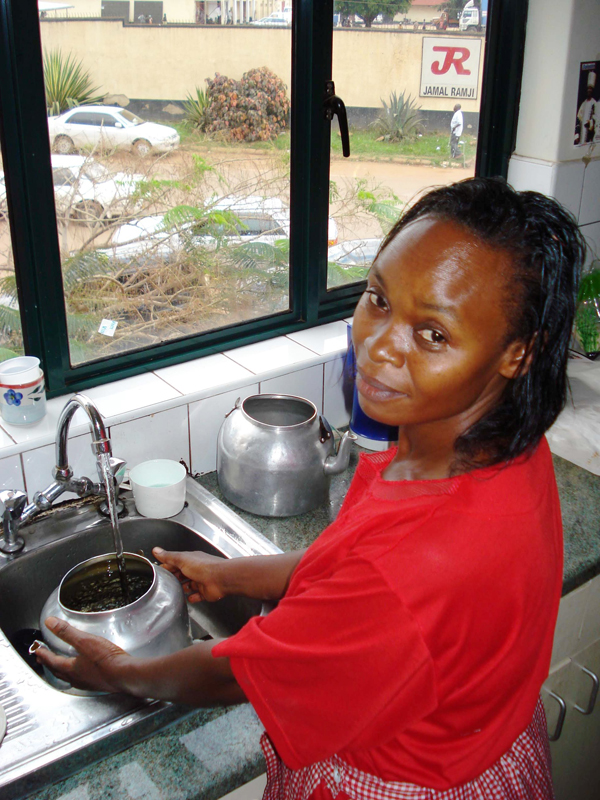By Joe Nam
Yellow Drinking Water, Can It Be Healthy?
KAMPALA, Uganda - People in this East African capital woke up one morning to a striking frontpage headline in the New Vision, Uganda’s leading newspaper. They had grown used to seeing splashy tales of corruption and sex scandals in the paper. But this story took them aback: The city’s yellowish drinking water not only looked strange, the newspaper said, but contained human waste and high-levels of dirt.
People were upset. They poured out their anger on radio talk shows, berating the managers of the National Water and Sewerage Corporation. But more than a year later, residents say not much has changed.
According to the newspaper report, laboratory tests showed evidence in the drinking water of bacteria that causes cholera, dysentery and diarrhea. The water also contained 12 to 40 times more dirt and other foreign matter than generally accepted safe levels.
No major health consequences have been reported. But that may be because people in Kampala routinely boil their water before drinking it. Nidege Pherry, a homemaker who lives on the edge of Kampala, said she always boils the family’s drinking water. She has five children. “I cannot take chances” she said. “Or I will end up paying more in medical bills.”
Dr William Muhairwe, the managing director of Uganda’s National Water and Sewerage Corporation, acknowledged that there was dirt in the water. But in a news conference after the newspaper report he insisted that there was no “bacterial contamination” and that the water was safe to drink.
On a television talk show later, he said he could only guarantee the safety of Kampala’s water as it left the treatment plant at the main reservoir. The condition of the water might be different, he said, when it reached people’s homes. .
Peter Balimunsi, an engineer and one of the supervisors of the treatment and distribution of drinking water in Kampala, said in a recent interview that he could not “guarantee that the city’s tap water is safe to drink.” Like the head of the water corporation, Mr. Balimunsi said the water was fine “as it leaves our reservoir.”
The city’s drinking water, which is drawn from Lake Victoria, six miles or 10 kilometers from the center of Kampala, is treated with chlorine at the reservoir plant, Mr. Balimunsi said. But he said the water pipes that carry water to homes and schools and offices around the city are in poor condition. Sometime the pipes break open. As water rushes through the pipes, he said, dirt and sewage is sucked in.
The pipes being used in Kampala were installed 50 years ago. They have an expected life span of 20 years. Water and sewage pipes were laid side-by-side in the same trenches, and then covered with dirt. Both lines are falling apart and sewage and drinking water mixes as they flow through the city.
Mr. Balimunsi places some of the blame on the people of Kampala. Often, he said, they are slow to report breaks in the water lines. They also make their own problems, he said, by failing to clean the water tanks at their homes.
Mr. Balimunsi said it would take an estimated $72 million and about five years to replace Kampala’s network of corroded water lines. But there is nothing like that amount of money available, he said. In 2008 year government spending on drinking water and toilet facilities declined to 1.8 percent of the national budget, from 4.9 percent in 2004. Total spending on water and sanitation in 2008 was $4 million, down from $11 million four years earlier.
The stated mission of the National Water and Sewerage Corporation is to provide “efficient and cost effective water and sewerage services, applying innovative solutions to the satisfaction of our customers.”
Dr Henry Ntale is a Project Coordinator of the Nile River Basin Organization, formed by the seven countries that share the waters of the Nile River and its tributaries. The countries are Egypt, Ethiopia, Kenya, Rwanda, Tanzania, Sudan and Uganda.
Dr. Ntale said it was hard to understand why clean drinking water was not being provided in Kampala. “Either the government feels that water is not a priority,” he said, “or water issues have not been well articulated to attract enough resource allocation.”

